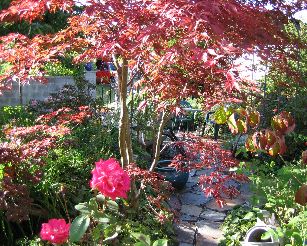 Dianne Roth’s work on her garden
wall
Dianne Roth’s work on her garden
wall
saved enough money for a trip to Europe
©2005 (#0001)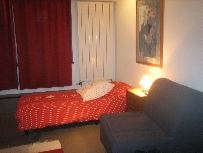 Find a simple room in someone’s
home,
Find a simple room in someone’s
home,
Liege, Belgium
©2005 (#0698)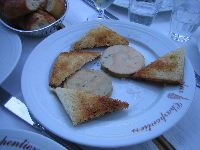 Instead of dinner, order an appetizer.
Instead of dinner, order an appetizer.
Fois Gras,Paris, France
©2005 (#1061)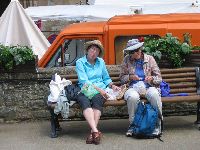 Picnic on a bench, Tregieire, France
Picnic on a bench, Tregieire, France
(#1002)
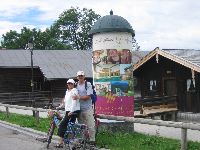 Rent a bike. Munich, Germany
Rent a bike. Munich, Germany
(# 1115)
 If possible, walk, L’ile d’Er,
If possible, walk, L’ile d’Er,
Brittany, France
(#00018)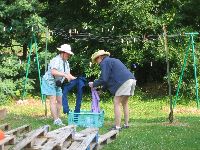 Do your laundry the local way,
Do your laundry the local way,
Brittany, France
©2005 (#0977) |
Alice’s Law
924 words
How To Find the Money to Travel the World
By Dianne Roth
Traveling is a splendid pastime.
You pack a few necessities into a small rolling suitcase, say
so-long to work, sleep for a few hours on a plane, and awake to
find yourself in a whole new world. Less than 100 years ago, the
same trip would have taken weeks of effort, not to mention the
massive amount of luggage that went along with the traveler.
Today, we benefit from speed, convenience, and comfort. Well,
there is nothing comfortable about being packed like sardines
in too-narrow, no leg-room, airplane seats. But, in comparison
to the buckboard, stage coach, or coal-fired train, airplanes
provide the traveler with comfort unimaginable 100 years ago.
For that alone I am grateful. I have always wanted to travel to
exotic places, try unusual foods, wander in the footsteps of the
ancients, and make friends around the globe. While I am sure I
would have braved the challenges of rugged travel, I am delighted
to have all of my travel time to spend at my destination.
Funding for my travels is another
thing. Living on a puny PERS pension might discourage many from
taking major trips, but those who know me, know that I live by
an unusual economic philosophy. It has three parts. First, some
expenses do not count. Second, the feeling of abundance does not
have to be expensive. And, last, I follow Alice’s Law of
Compensatory Found Income.
To start with, the airline ticket and any hotel expenses mostly
count. Those are things you would not be purchasing if you stayed
home. However, not using utilities at home (showers, heat, electricity)
allows me to not count a bit of the hotel. I shop around for good
fares and try to find hotels that are clean, convenient, and cheap.
I will resort to youth hostels if I cannot find a cheap sleep
elsewhere. Youth hostels are wonderful and not a disappointment
if I cannot find a hotel.
Food, of the picnic variety, does not count. I would have to eat
at home, and since I am not at home, I use the food budget to
eat. A few nights on the town count, but not very much as I go
out to eat when I am home, also. And, generally, food out at a
local eatery is cheaper than the food out at home. Lunches tend
to be of the nuts and fruit kind of snack, then I eat ethnic in
the evenings. Alcohol in a bottle from the market does not count,
a glass of wine with dinner counts. At home or away, a glass of
wine is expensive.
Up to a point, souvenirs and entrance fees do not count. When
I am at home, I give myself a monthly allowance. When I am not
at home, I have my monthly allowance to spend. When my allowance
is spent, I must carefully evaluate if I want to dip into savings.
Sometimes I do, often I do not.
Secondly, abundance is a mind set.
Look around as you travel. Many of the people you have traveled
around the world to see, earn a daily wage of about what you spend
on dinner, and they work harder than you ever will. It is not
how much money you have or spend that will fill your soul, it
is little things, the beauty, culture, and connections to the
scene you have chosen to join, that make your life abundant.
One of the most abundant meals
I ever had was in Teotitlan de Valle, Mexico. I bought an avocado
and a lime at the market and a beer at a hole-in-the-wall hardware
store. I sat on a stone wall, squeezed the lime onto the avocado,
sipped my beer, and scooped the avocado into my mouth with my
thumb. The view was magnificent, the company sublime, and the
food incomparable. Life was good! A night on the town is great,
but simple food is so... abundant.
Then, there is Alice. I do not know who Alice is, but I sure do
like her economic thinking. Alice’s Law of Compensatory
Found Income goes like this. If you have to spend some money,
and then, you don’t have to spend it, it is yours to spend!
Here is an example. Two years ago I wanted a concrete block wall
built across the back of my yard. I thought it would look a bit
like southern France and would separate my yard from the vacant
lot behind me. I got three estimates in the range of $2800 to
$3500. And, that price was with the concrete footing under the
blocks already in place. So, I would have to build the footing
and still spend around $3000. The idea of building the entire
wall myself was daunting, but not as daunting as spending $3000+.
The end result is a hand built
(by me) wall that I love. It came with a price tag of $1000. Wow!
According to Alice, I was going to have to spend $3000. I only
had to spend $1000. I have $2000 to spend! It works for me. I
worked hard on that wall, consider it wages.
In the end, I guess it is about how you want to spend what you
have. Hearing languages other than my own, visiting sights right
out of the history books, and seeing the art of the masters in
person thrills me beyond monetary measure. In addition, meeting
people from around the world and finding them warm and welcoming
is my way of investing in the future.
Dianne Roth is a teacher, mother, grandmother, and freelance
writer. She lives in Oregon.
|
|

